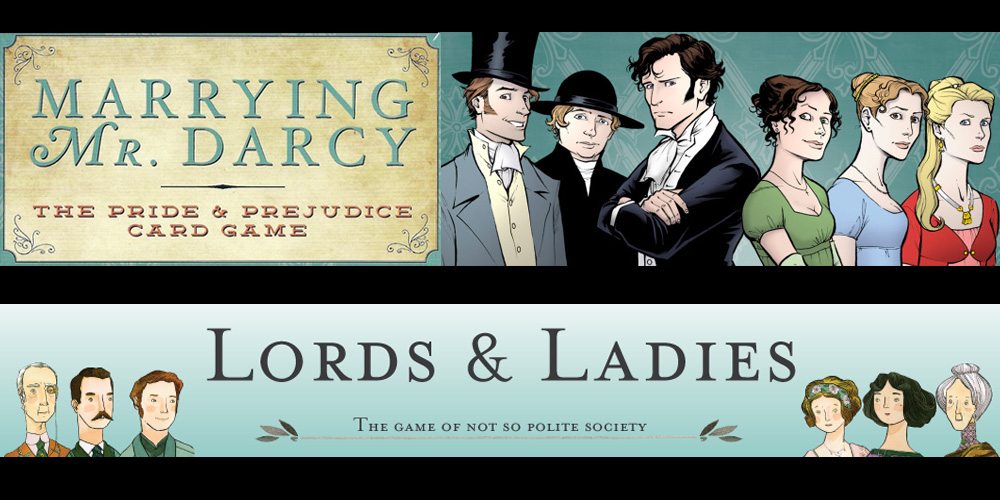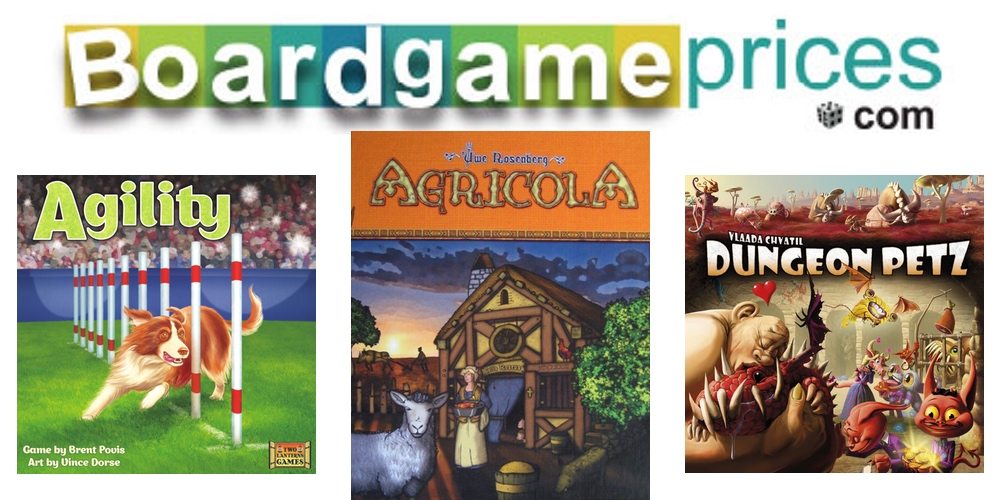There are some themes that are pretty common in board games: fighting (zombies or monsters or just other people), magic, farming, animals. I haven’t played many games that focus on, say, attracting a suitable husband in the early 1800s or the intricacies of societal norms in the early 20th century. But—lo and behold—here are two games about polite (or sometimes not-so-polite) society: Marrying Mr. Darcy and Lords & Ladies.
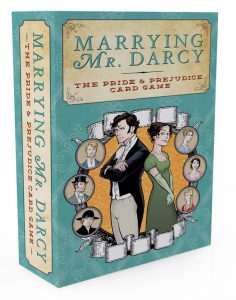 We’ll start with Marrying Mr. Darcy: The Pride & Prejudice Card Game, which was designed by Erika Svanoe and funded through a Kickstarter campaign in October 2013. The initial print run sold out, and it’s now back in stock for $30 retail. There’s also a print-and-play version for $6.99 if you want to make your own set.
We’ll start with Marrying Mr. Darcy: The Pride & Prejudice Card Game, which was designed by Erika Svanoe and funded through a Kickstarter campaign in October 2013. The initial print run sold out, and it’s now back in stock for $30 retail. There’s also a print-and-play version for $6.99 if you want to make your own set.
At a glance: Marrying Mr. Darcy is for 2 to 6 players, ages 13 and up, and takes 30-60 minutes to play. You could play with younger players, though depending on their opinion of Jane Austen they might not appreciate the subtle humor quite as much.
Components:
- 8 Heroine cards
- 6 Suitor cards
- 1 Old Maid card
- 100 Character cards
- 60 Event cards
- 6 Reference cards
- 1 6-sided die
The cards are pretty nice-looking, with some stock imagery used on most of the cards, and Erik Evensen’s artwork for the various characters from the book. The card quality is pretty nice, and the box is (hooray!) just about the right size to hold all of the cards, with a plastic insert that helps keep them and the die in place.
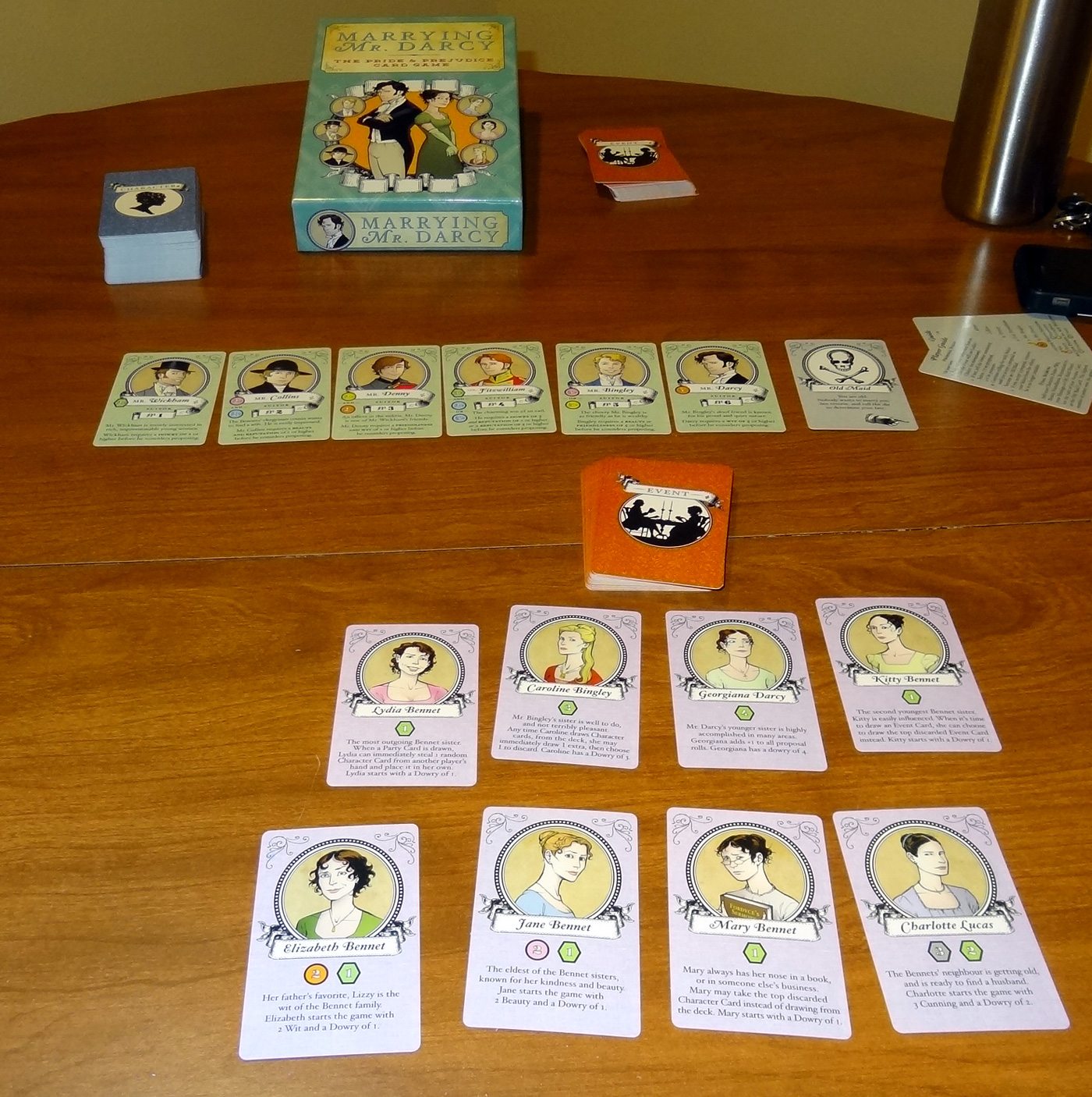
The Heroines and Suitors are from Pride and Prejudice, and each Heroine card has its own list of scores for each suitor. For instance, Elizabeth Bennet scores 15 points if she marries Mr. Darcy, her top choice (of course), but only 12 for Col. Fitzwilliam, and a mere 5 points for Mr. Wickham. Meanwhile, the other Heroines also get points if they marry Mr. Darcy, but he’s not the top choice for any of them. And Georgiana Darcy cannot marry her big brother Mr. Darcy at all.
There is a bit of flavor text on the cards, particularly the Event cards, that helps set the scene for what’s going on, but isn’t entirely necessary to the gameplay. On the other hand, if you’re not interested in the foibles of nosy Lady Catherine, this probably isn’t the game for you anyway.

How to Play
The goal of the game is to have the most points by the end of the game by acquiring the most Character points and Marriage points (by successfully marrying a good suitor).
Each player takes a Heroine card (you can roll off for the privilege of choosing first); some Heroines have starting bonuses that indicate some number of Character points, Cunning, or Dowry that they begin with. The Suitor cards are set out in order, with the Old Maid card at the end.
The Event cards are shuffled and placed in the center of the table. The number of Event cards used depends on the number of players, but the Event card deck determines the length of the game.
The Character cards are shuffled, and each player is dealt three cards. The rest of the deck is placed in the center of the table.
The game is played in two stages: Courtship and Proposal.

During Courtship, you draw an Event card, follow the instructions, and then discard down to five Character cards in your hand. The Event cards have various effects, some good and some bad. Most of them will also have instructions about how many Character cards to draw and play.
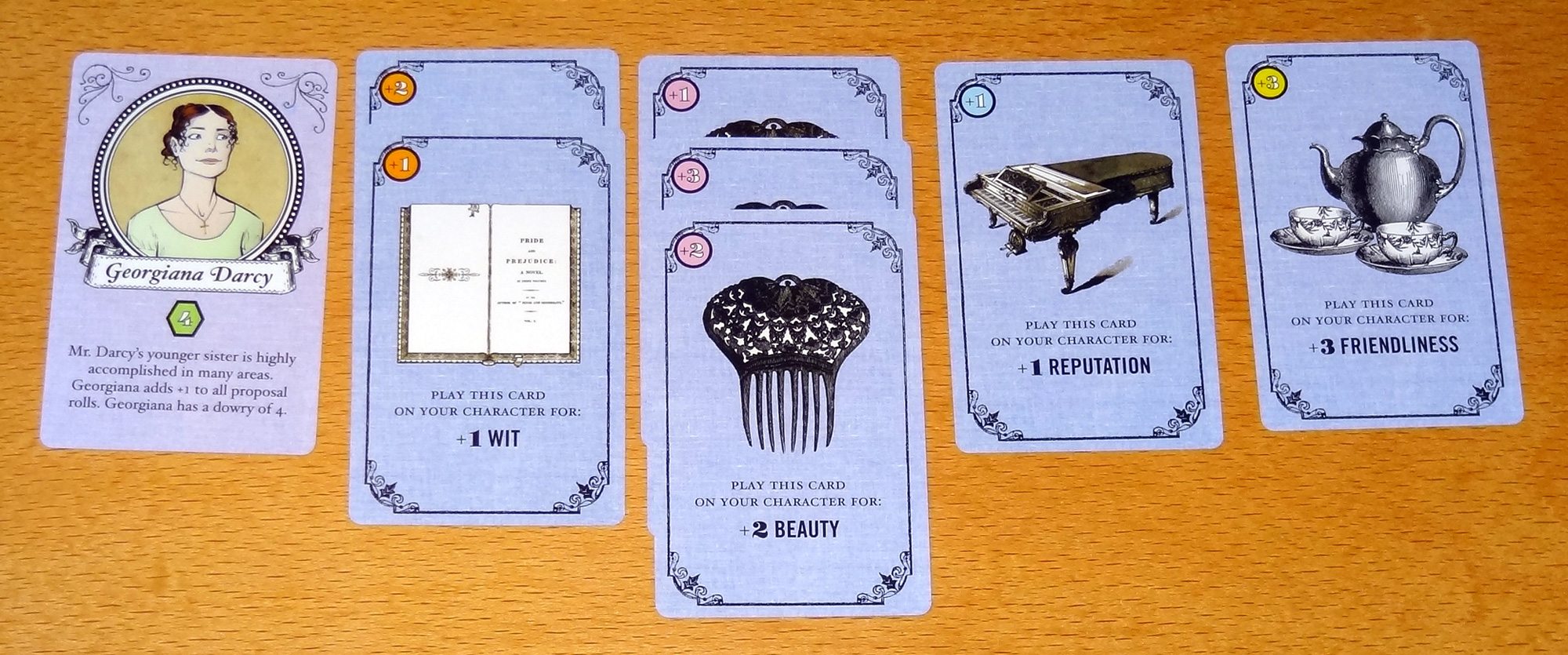
Character cards allow you to increase your Reputation, Beauty, Friendliness, Wit, and Friendliness. You can also increase your Dowry, or add to your Cunning. Cards are played face up next to your Heroine card, with each attribute having its own stack. Some cards can be used either to increase your Cunning (played face-down) or to discard a Character card on another player. Cunning cards don’t give you points at the end of the game, nor do they help you qualify for a suitor, but they do let you enter the Proposal stage first, which can be an advantage.
The Courtship stage ends when all the Event cards have been played.
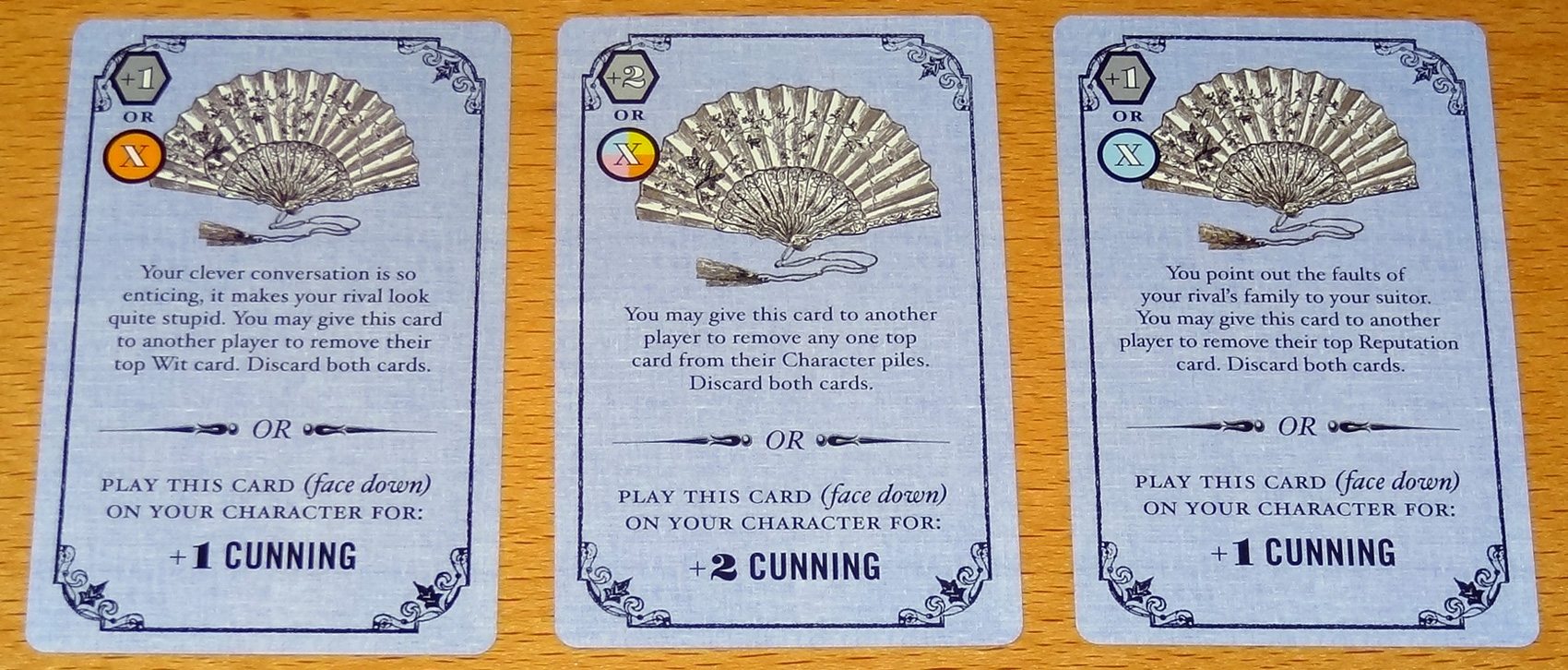
During the Proposal stage, everyone first adds up their Cunning, which determines the order in which players will attempt to get proposals.
Of the Suitors who are available, you determine which of them are eligible—that is, you have enough Character points and Dowry to meet their standards. (For instance, Mr. Wickham just wants 2 Dowry, but Mr. Bingley wants either 5 Beauty or 5 Friendliness.) Starting with the lowest number, you roll the die. On 4 or higher, he proposes to you, and you may decide whether to agree to marry him. If you refuse, you move to the next eligible suitor and roll again. Once you’ve turned down a suitor, he won’t propose again. If you don’t marry anyone, either because you didn’t meet anyone’s standards or because you didn’t get a proposal (or turned one down and didn’t get another), you refer to the Old Maid card, roll the die, and see what the result is.
If you do accept a proposal, you take that Suitor out of the lineup, and he is not available for the other players.
There’s also a “Ladies’ Choice” option: If you have more than one eligible Suitor, you may decide to put all your eggs in one basket and only accept proposals from a single Suitor. In this case, you only roll the die once, but you get to add 1 to your roll.
Once everyone has finished the Proposal stage, you add up your points. First, you get points for your husband (if you have one), and you get points for all of your Character points—Wit, Beauty, Friendliness, and Reputation. (Dowry and Cunning don’t count toward score.) The highest score wins; Dowry is the first tie-breaker and Cunning is the second tie-breaker.
There are various variations provided in the rules, too: one allows you to spend Cunning to increase your roll for a Suitor, but then somebody else may get a chance to try for a Proposal before you get through all the available men. Another lets you bank Event cards for emergencies. “Everyone Loves Mr. Darcy” makes everyone interested in—you guessed it—Mr. Darcy and so everyone is using a common list of points for the suitors. Finally, there are some variant rules for playing with 7 or 8 players, since it’s easy to run out of cards.
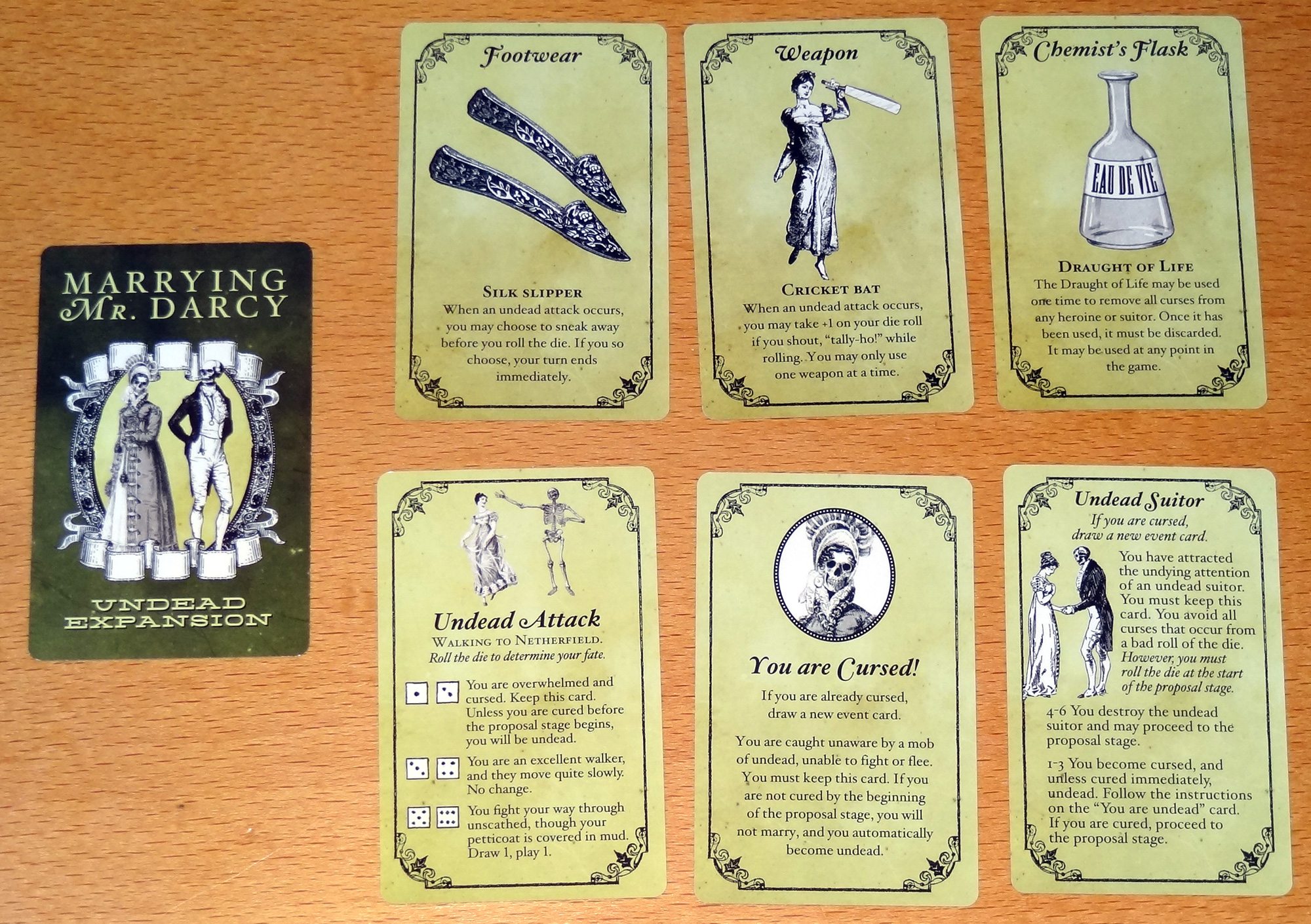
And for you zombie fans, there’s an optional Undead Expansion Pack so you can play Pride & Prejudice & Zombies. This set of 20 cards can be mixed in to add some funny changes: now you can become a zombie, turn a Suitor into a zombie (even after somebody marries him!), and kill zombies.
The Verdict
I’ve played Marrying Mr. Darcy with people who love Pride & Prejudice and those who know nothing about it, and it seems to do pretty well with both groups. Certainly, though, if you’re a big Jane Austen fan, the game will hold a little more meaning for you because you’ll recognize the characters and situations that arise.
It’s a fairly light game and a lot depends on luck, so it’s definitely better for the casual crowd than those who love heavy strategy games. If you don’t draw Event cards that let you play Character cards, you may get stuck with a lot of interesting effects but still be unable to attract a suitor. Or, you may get all the Character points you need to marry your top choice, but the roll of the die means he doesn’t even propose to you. So if you’re looking for a game in which the outcome is determined primarily by the choices you make, Marrying Mr. Darcy might not satisfy you.
However, there are still interesting choices that you get to make within the confines of the game—I suppose maybe that reflects the lives of the women in the story a little, too. When you do get to play Character cards, you can choose which ones to play. You can decide whether to use Cunning cards to give you first shot at suitors or to tear down your opponents. And in some cases, you’ll get to decide whether to save an Event for later effects, or play Character cards immediately. Even an old maid who has good Character built up has a chance at scoring some points, though certainly not as many as somebody who marries their top choice of suitors.
In the end, though, maybe Marrying Mr. Darcy isn’t so much about the final outcome as it is about the interactions and reactions to the events. As the female characters in Jane Austen’s novel, you have dreams and aspirations but you’re also bound by social conventions and societal norms. The outcome of the game won’t always match up with the plot of the novel, but when it ends you’ll have a fun story to tell.
You can pick up a copy of Marrying Mr. Darcy from Amazon, Game Salute, or check your local game store.
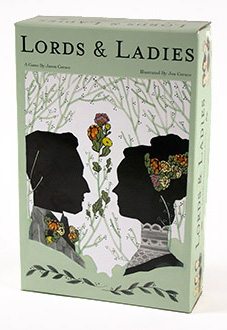 And now let me introduce you to Lords & Ladies, a game by the brother-sister team Jason (designer) and Jen (illustrator) Corace and published by Gryphon Games. Lords & Ladies was also funded through Kickstarter in October 2013. The game is all about gaining (and maintaining) the status of your family by marrying the right people, having children, and hiring servants. But, of course, beneath the surface of this polite society there’s a lot of impolite gossip making the rounds.
And now let me introduce you to Lords & Ladies, a game by the brother-sister team Jason (designer) and Jen (illustrator) Corace and published by Gryphon Games. Lords & Ladies was also funded through Kickstarter in October 2013. The game is all about gaining (and maintaining) the status of your family by marrying the right people, having children, and hiring servants. But, of course, beneath the surface of this polite society there’s a lot of impolite gossip making the rounds.
At a glance: Lords & Ladies is for 2 to 5 players, ages 10 and up, and takes about an hour to play. It retails for $29.95. The age you can play with will depend on whether you mind explaining to your kids things like “Bedroom Problems” or illegitimate children. I think the gameplay should be easily picked up by ages 10 and up, but prepare yourself for awkward questions if your kids don’t watch Downton Abbey.

Components:
- 10 Starter cards
- 36 Birth cards
- 32 Suitor cards
- 33 Servant cards
- 26 Gossip cards
- 3 Awards cards
- 1 Birth die
- 1 Round marker
- 1 Status board
- 40 Gold tokens
- 30 Gossip tokens
- 20 Status tokens
- 1 dry erase marker
- 5 pawns
The cards are fairly simple and generally easy to understand: there are icons for Status that indicate how much status you gain from any person, whether they come into your family through marriage, birth, or hiring. The Starter and Birth cards are actually thicker cardboard with a glossy surface so that you can make up your own names for your lords and ladies, writing them on with the included whiteboard marker. (We’ve found it’s also good if you want to add some facial hair or other features.)

The illustrations are nice, though you’ll find that for the Birth characters there are only so many male and female faces that are reused. It led to some funny stories about suspecting some infidelity when sons in three different families looked really similar, but otherwise isn’t too much to worry about. The “Foreign Affairs” mini-expansion (included) features some more Suitors, each illustrated by a different artist.
The cards are nice quality and have different colored backs so you can tell them apart. One thing I do wish is that the backs were labeled with the different types (servants, gossip, suitors, etc.) to make it easier when first learning the game.
The wooden tokens are nothing fancy, but are nice. They look a bit like candy, though, because of the pastel colors, so keep an eye on your little kids.
Oh, and since I’m always complaining about game boxes that are too large for the games inside, I should make note that Lords & Ladies fits exactly into its box, with minimal wasted space. Hurrah!
How to Play
The goal of the game is to achieve the most status through marriage, hiring servants, having children, and acquiring wealth.
Each player gets one Lord or Lady to begin, one gold coin, and a gossip card or two (depending on player count). Three servants and three suitors are dealt out face up, with the rest of the decks to the side (face up) so you can see who’s “on deck.” The three Award cards and the tokens are all placed in a supply, and everyone starts with status “1” (indicating the status of your starting character.
During your turn, first you either take 2 gold or 1 gossip card. Then you do one of the following:
- Marry an available suitor
- Hire an available servant
- Try to have a child (if you have a married couple)
- Take a gold
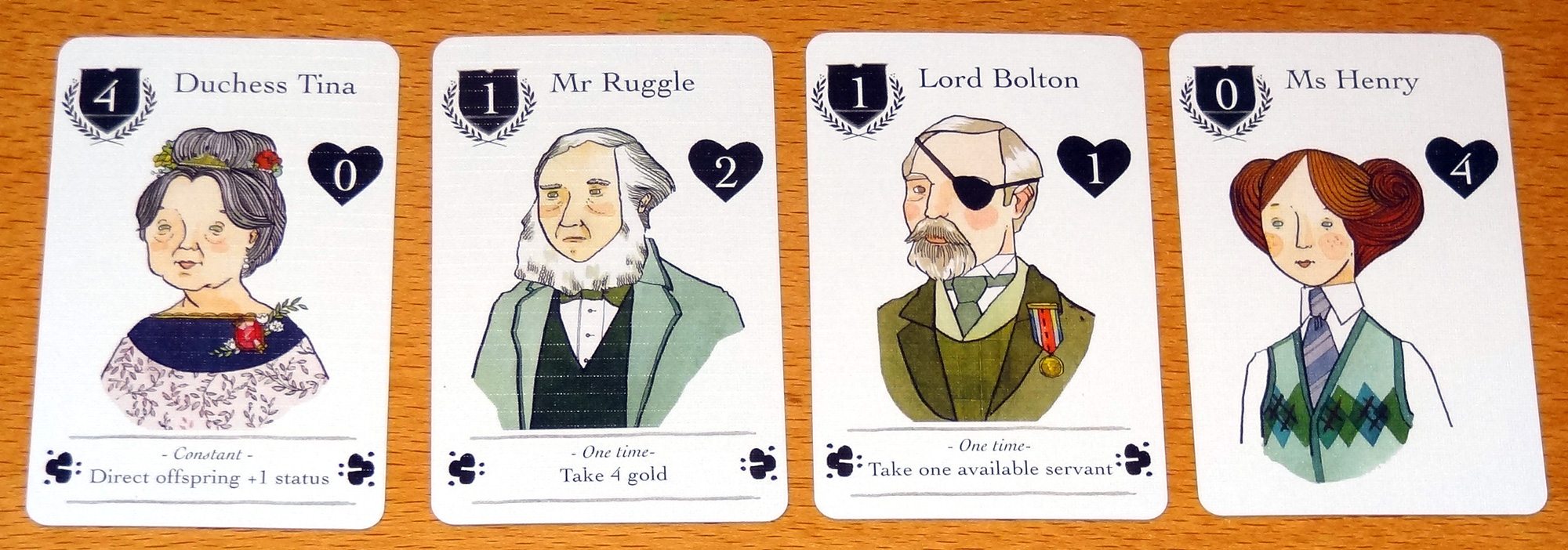
When marrying, you may marry at or below your station for free—that is, if the status of your family member matches or exceeds the suitor’s. However, if the suitor has a higher status, then you pay the difference in gold. Some suitors have immediate effects when you marry them—they may have gold or servants, or they might give more status to their offspring.
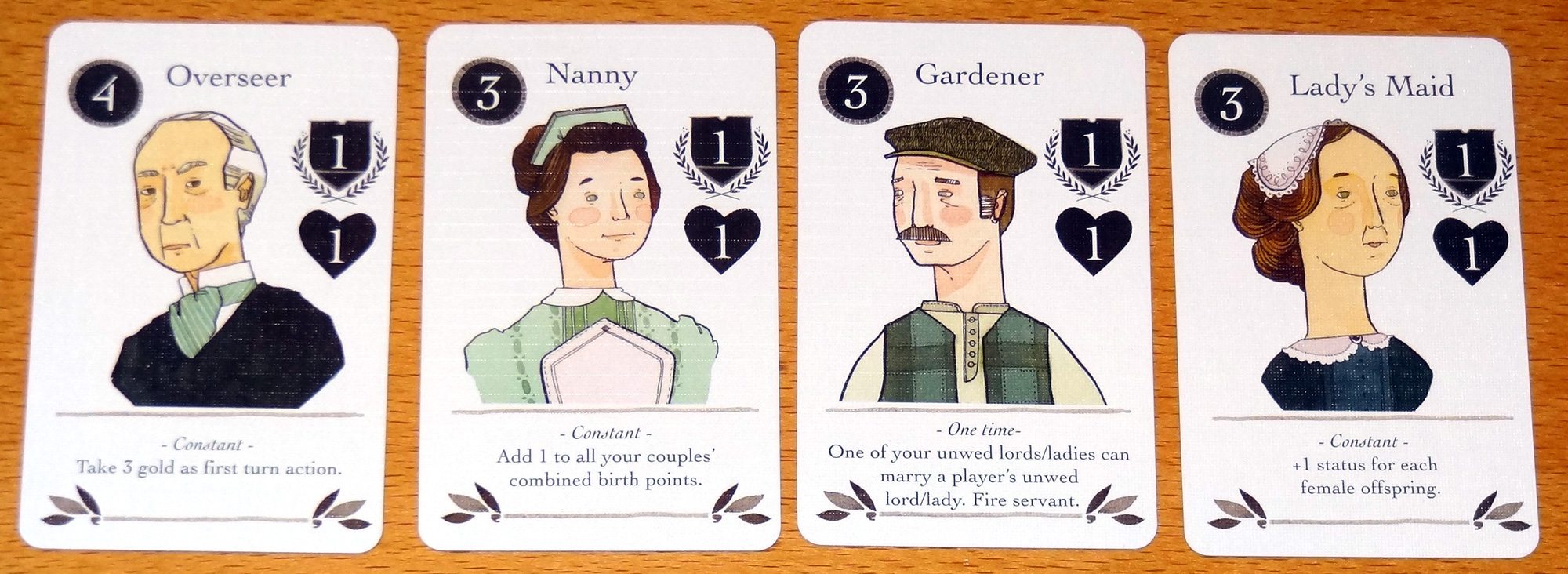
To hire a servant, you pay gold equal to its cost and place the card near your family. Servants have either ongoing effects or one-time effects. When you use a one-time effect, that servant is then discarded.
To have a child, you roll the birth die. Your roll must be less than or equal to the birth number of your couple, as indicated in the heart icons. The higher the birth number, the easier it is to have a child. If you succeed, take a Birth card, give your child a name, and add it to your family.
Whenever you add or remove characters from your family, you immediately adjust your status level on the scoreboard to reflect the changes.
Finally, during the round (at any time, not just during your turn) you may:
- Play gossip cards
- Use a servant’s power
- Pay off gossip with 6 gold
- Pay 6 gold for a status token
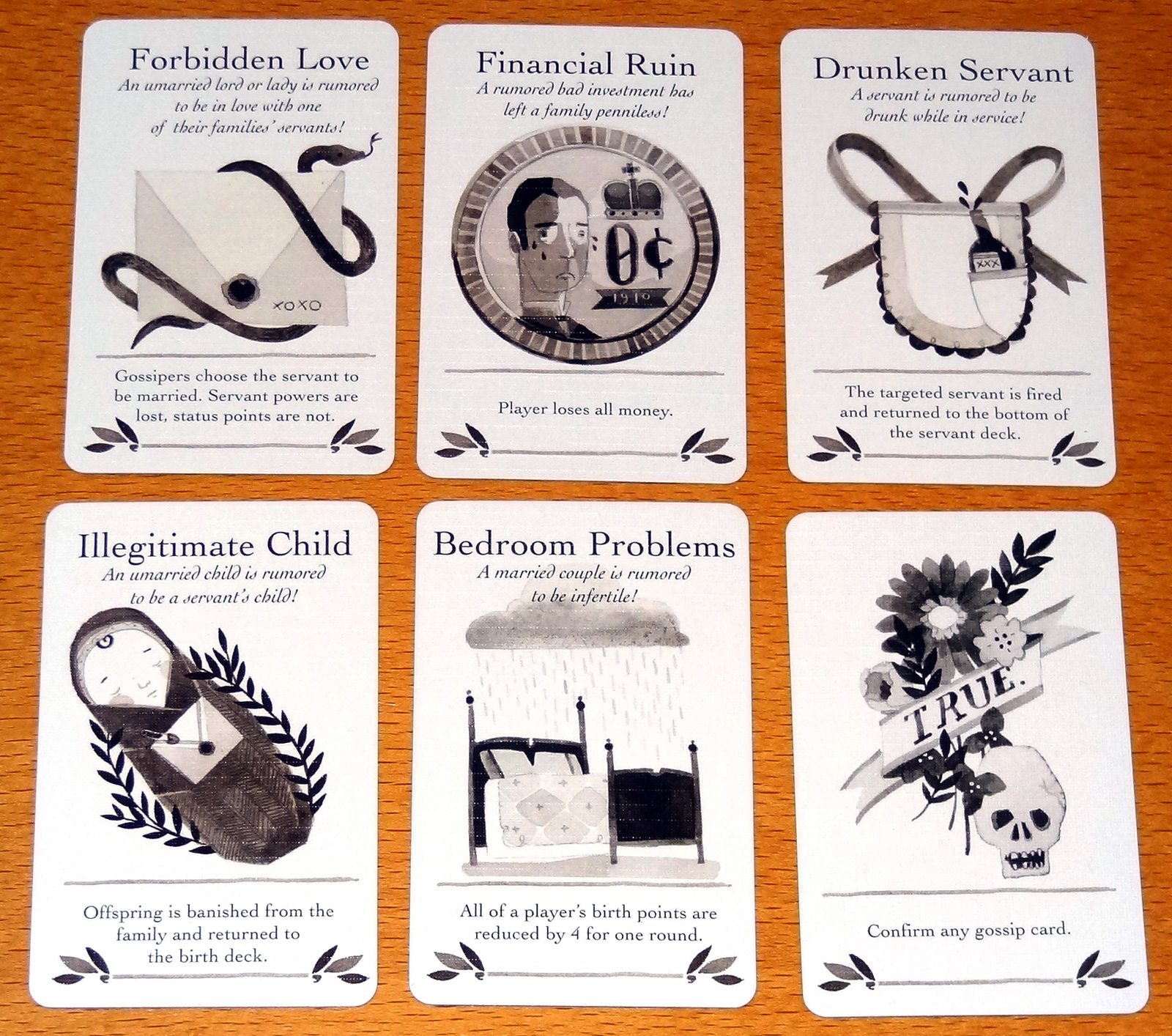
Gossip cards are vicious rumors that you spread about other families—and they might be true! It takes two gossip cards during the same round to affect a player, either two copies of the same card or any card matched with a “True!” card. If successful, the gossiping players each take a gossip token. The affected player may pay each gossipmonger 3 coins in order to discard them, and then no gossip tokens are awarded.
For 6 gold, you can also buy status outright. Take a status token, which moves you up the status track one point.
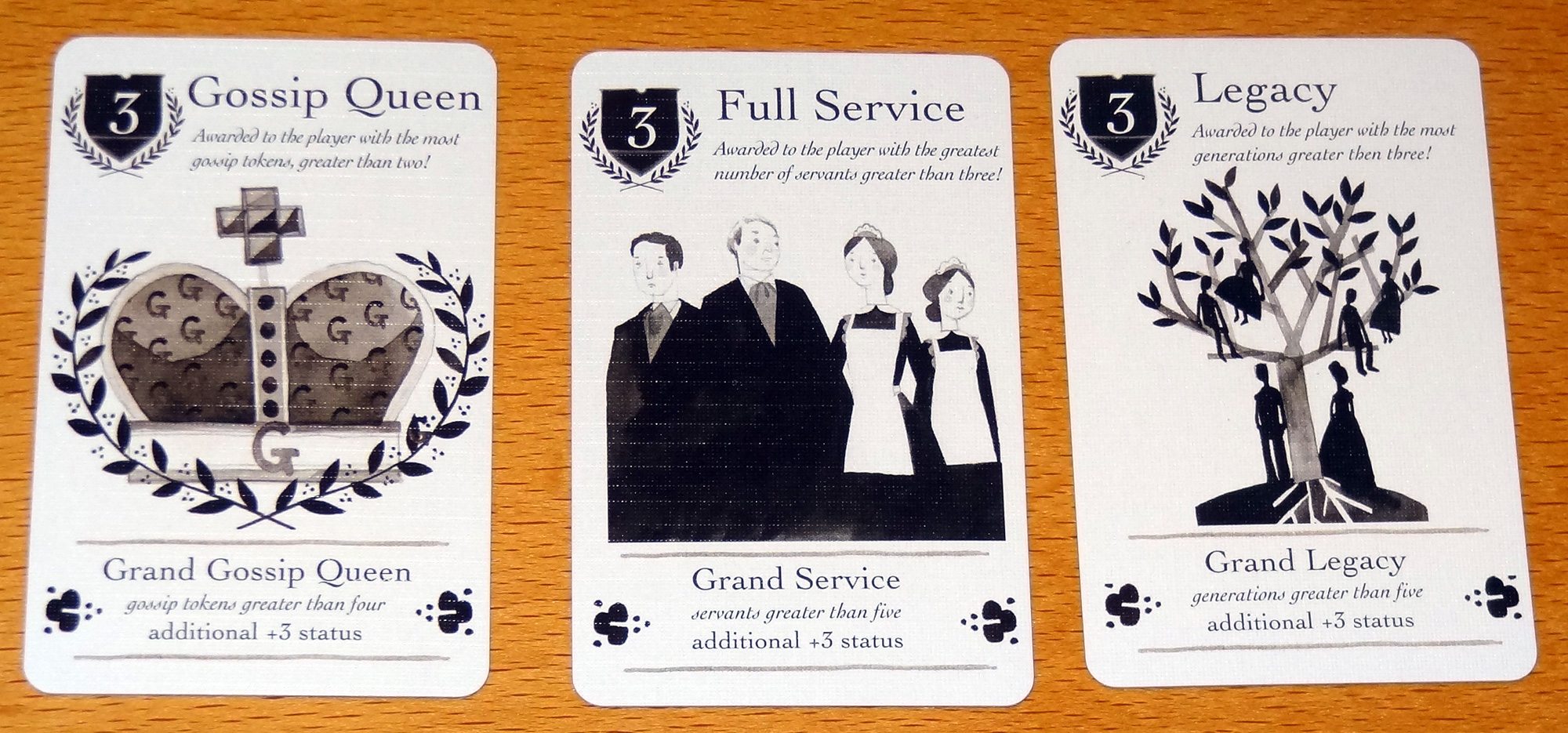
The Awards cards give you bonus status for having the most generations, the most servants, or the most gossip tokens. You must have a minimum to take the card, and other players may steal them by surpassing you.
At the end of each round, suitors and servants are replenished, and the starting player passes to the left.
The game ends if any player has 18 or more status points at the end of a round, and the highest status wins.
The two-player game has a slight change in rules but is otherwise fairly similar.
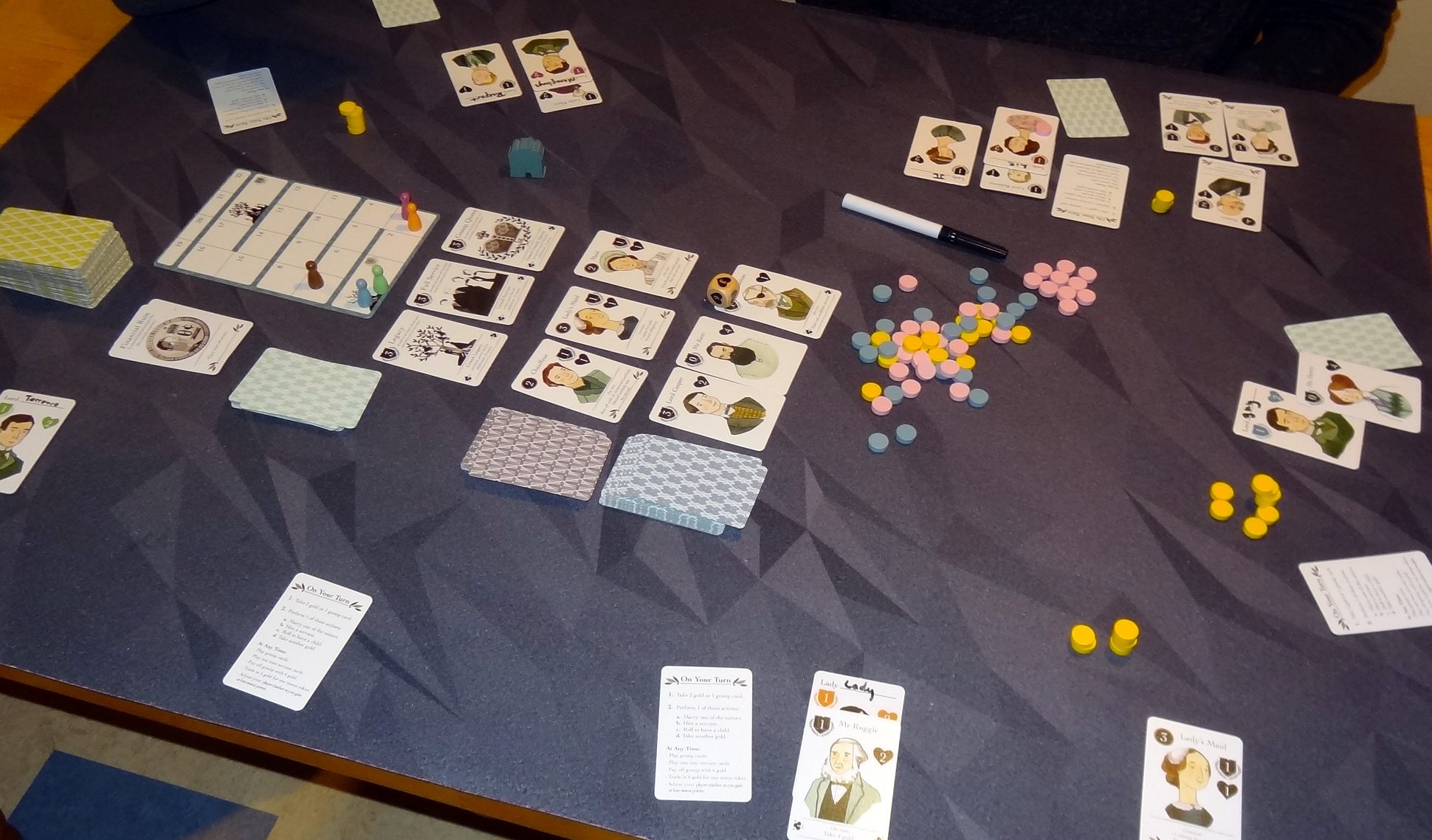
The Verdict
Lords & Ladies is a fun (and funny) game, particularly when you take advantage of the gossiping and certain servants. There’s a lot of “take that” in the game, so you do need to play it with those who have a good sense of humor. Your unmarried children might run off with a servant, or marry into another player’s family, or even turn out to be illegitimate. You may have to fire a servant for being drunk. Or you may even face financial ruin.
I like that there are a few different ways to gain status: hiring servants, marrying well, having children, even spreading gossip. If you focus your efforts in one area, you may get one of the awards, too. There’s a lot of back-and-forth as you decide between helping yourself and hurting your opponents.
The game is pretty easy to learn and is more of a casual game, best suited for those who like getting into character and don’t mind a game that has a bit of luck to it. That doesn’t mean there isn’t some strategy, but sometimes it’s just as important to convince your fellow players to help you spread gossip on somebody—so that they have fewer gossip cards left to play on you.
If you enjoy period dramas like Downton Abbey and Upstairs Downstairs, you’ll get a kick out of Lords & Ladies.
Disclosure: GeekDad received review copies of both games.
